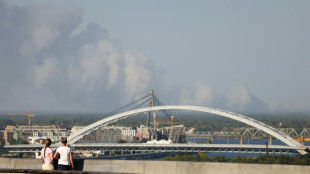Storm Idalia strengthens into hurricane, barrels toward Florida
Storm Idalia strengthened into a hurricane Tuesday as forecasters predicted it would intensify and become "extremely dangerous" before making landfall in the US state of Florida.
"Idalia now a hurricane. Expected to rapidly intensify into an extremely dangerous major hurricane before landfall on Wednesday," the National Hurricane Center (NHC) said in a 0900 GMT public advisory.
Major hurricanes are usually a Category 3 or higher on the five-level Saffir-Simpson scale -- storms that the NHC says can cause "devastating" and "catastrophic" damage.
At the time of the advisory, Idalia was about 370 miles (600 kilometers) south-southwest of Tampa, Florida, and packing maximum sustained winds of 75 miles per hour (120 kilometers per hour).
Florida Governor Ron DeSantis warned the storm could have major impacts along the Gulf of Mexico, telling a news conference on Monday that evacuations would take place and residents should prepare.
US President Joe Biden spoke with DeSantis earlier on Monday and approved an emergency declaration for the state, promising it would have his full support, a White House spokesman said.
Various NHC warnings have been put in place in Florida, Georgia and South Carolina as heated Gulf of Mexico waters turbocharge the storm.
"There is a danger of life-threatening storm surge inundation along portions of the Florida Gulf Coast... including Tampa Bay and the Big Bend region of Florida," the NHC said in its latest advisory.
The NHC also expected hurricane and tropical storm conditions in parts of western Cuba through Tuesday morning.
Flash and urban flooding may hit parts of Florida and southern Georgia into Wednesday, the NHC said. Flooding could reach parts of South Carolina Wednesday into Thursday.
The US Federal Emergency Management Agency (FEMA) is preparing for the storm's impact, including by deploying some of its staff, according to the White House.
Cuban authorities declared a hurricane alert for the provinces of Pinar del Rio and Artemisa as well as Isla de la Juventud, an island.
Thousands of Cubans evacuated or fled ahead of the storm, authorities and state media said.
After passing Cuba the storm will move out over the Gulf, which scientists say is experiencing a "marine heat wave" -- energizing Idalia's winds as it races towards Florida.
The storm "will be moving over waters near 31C (88 degrees Fahrenheit)," the NHC said Monday.
- Thousands leave homes -
Cuban state media said about 8,000 people had left their homes to seek shelter with family or friends in Pinar del Rio, the same province walloped last September by Hurricane Ian, which killed at least two people and left millions without electricity.
Idalia was already buffeting parts of southeastern Mexico with wind and rain on Monday.
In the state of Quintana Roo, home to Cancun and other coastal tourist resorts, Idalia dumped rain and put a damper on one of the last weekends of summer vacation.
Scientists have warned that storms are becoming more powerful as the world gets warmer due to climate change.
In 2022, Florida was also hit by Hurricane Ian, which killed almost 150 people and caused extensive damage.
It wiped out entire neighborhoods, causing more than $100 billion worth of damage -- by far the world's most expensive weather disaster of the year.
burs-st/bgs/tjj/dva/aha
L.Keller--HHA


